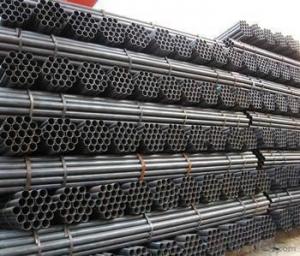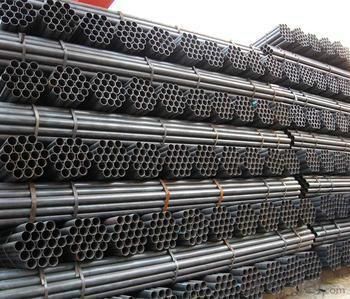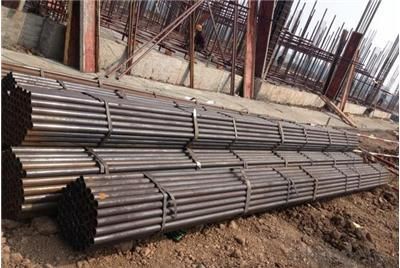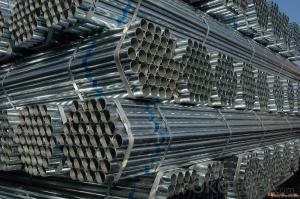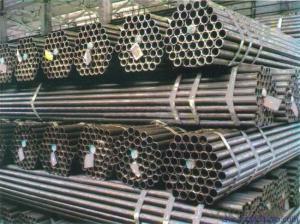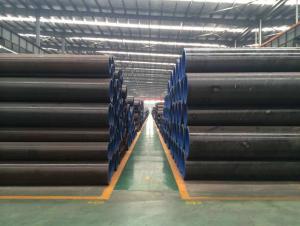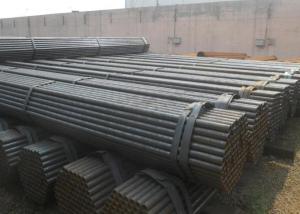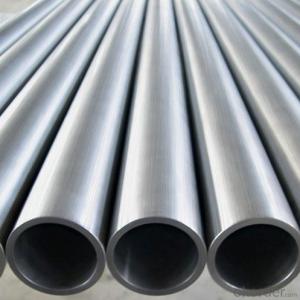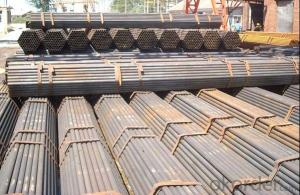Welded Black ERW Pipe BS Standard for Water Gas Oil
- Loading Port:
- Tianjin
- Payment Terms:
- TT OR LC
- Min Order Qty:
- 30 m.t.
- Supply Capability:
- 7000 m.t./month
OKorder Service Pledge
OKorder Financial Service
You Might Also Like
1、Structure of Welded Black ERW Pipe BS Standard:
Welded Black ERW Pipe BS Standard is electric resistance welding, the abbreviation for ERW for transporting oil and natural gas vapor liquid objects, can meet the requirements of high and low pressure, the transport in the world with pipe sector accounted for a pivotal position.With sound reputation and high quality , we will offer clients a wonderful business experience.
2、Main Features of Welded Black ERW Pipe BS Standard:
• High manufacturing accuracy
• High strength
• Good visual effect
• Good view and appearance
• Good shape
• Reasonable price
• Small inertia resistance
• Strong heat dissipation ability
3、Welded Black ERW Pipe BS Standard Specification:
Standard | GB, DIN, ASTM ASTM A106-2006, ASTM A53-2007 |
Grade | 10#-45#, 16Mn 10#, 20#, 45#, 16Mn |
Thickness | 1 - 33 mm |
Section Shape | Round |
Outer Diameter | 21 - 610mm |
Place of Origin | Tianjin, China (Mainland) |
Secondary Or Not | Non-secondary |
Application | Hydraulic Pipe |
Technique | Cold Drawn |
Certification | API |
Surface Treatment | factory state or painted black |
Special Pipe | API Pipe |
Alloy Or Not | Non-alloy |
Length | 5-12M |
Outer Diameter | 21.3-610mm |
Grade | 20#, 45#, Q345, API J55, API K55, API L80, API N80, API P110, A53B |
Standard | ASME, ASTM |
1) Material:20#(ASTM A 106/A53 GRB.API5LGRB,GB),45#,16Mn,10#.
2) Specification range:OD:21.3-610mm,WT:6-70mm,length:6-12m or according to the requirement of clients.
3) Excutive standards:GB,ASME API5L.ASTM A 106/A53,Despite of the above standards,we can also supply seamless steel pipe with standard of DIN,JIS,and so on,and also develop new products according to the requirements of our clients!
4) Surface:black lacquered,varnish coating or galvanized.
5) Ends:Beveled or square cut,plastic capped,painted.
6) Packing:bundles wrapped with strong steel strip,seaworthy packing.
4、Packaging & Delivery
Packaging Details: | seaworthy package,bundles wrapped with strong steel strip |
Delivery Detail: | 15-30days after received 30%TT |
5、FAQ of Welded Black ERW Pipe BS Standard:
①How is the quality of your products?
Our products are manufactured strictly according to national and internaional standard, and we take a test
on every pipe before delivered out. If you want see our quality certifications and all kinds of testing report, please just ask us for it.
Guaranteed: If products’ quality don’t accord to discription as we give or the promise before you place order, we promise 100% refund.
②How about price?
Yes, we are factory and be able to give you lowest price below market one, and we have a policy that “ for saving time and absolutely honest business attitude, we quote as lowest as possible for any customer, and discount can be given according to quantity”,if you like bargain and factory price is not low enough as you think, just don’t waste your time.Please trust the quotation we would give you, it is professional one.
③Why should you chose us?
Chose happens because of quality, then price, We can give you both.Additionally, we can also offer professional products inquiry, products knowledge train(for agents), smooth goods delivery, exellent customer solution proposals.Our service formula: good quality+good price+good service=customer’s trust
SGS test is available, customer inspection before shipping is welcome, third party inspection is no problem.
6、 Welded Black ERW Pipe BS Standard Images:
- Q: How are steel pipes used in the agricultural sector?
- Steel pipes are commonly used in the agricultural sector for various purposes such as irrigation, drainage, and livestock handling. They are used to transport water from a source to fields, as well as to distribute water evenly across crops through irrigation systems. Steel pipes also help in draining excess water from fields and preventing waterlogging. Additionally, they are utilized for constructing fences, gates, and cattle handling facilities, ensuring the safety and containment of livestock.
- Q: What are the factors affecting the cost of steel pipes?
- The factors affecting the cost of steel pipes include raw material prices, production and manufacturing costs, transportation and logistics expenses, market demand and supply dynamics, import and export tariffs, government regulations, and the overall economic conditions. Additionally, factors such as the grade and quality of steel used, diameter and thickness of the pipes, and any additional features or coatings can also influence the cost.
- Q: What is the difference between internal lining and external coating of steel pipes?
- The difference between internal lining and external coating of steel pipes lies in their respective purposes and locations. Internal lining refers to the material applied inside the steel pipes to protect the inner surface from corrosion, abrasion, or other forms of damage. It acts as a barrier between the transported fluids or substances and the steel pipe, preventing them from coming into direct contact and causing deterioration. The internal lining is typically made of materials like epoxy, polyethylene, or cement mortar, depending on the specific requirements and the nature of the transported substances. It ensures the longevity and integrity of the steel pipe by reducing the chances of internal corrosion and minimizing the risk of contamination. External coating, on the other hand, is applied to the outer surface of the steel pipes. Its main purpose is to provide protection against external factors such as weathering, soil corrosion, and mechanical damage. The external coating acts as a shield, safeguarding the steel pipe from environmental conditions like moisture, UV radiation, chemicals, and physical impact. Common materials used for external coatings include fusion-bonded epoxy, polyethylene, polypropylene, or bitumen. The choice of coating depends on factors like the exposure conditions, temperature, and the type of soil or surroundings the steel pipe will encounter. In summary, while internal lining protects the inner surface of steel pipes from corrosion and damage caused by transported substances, external coating acts as a barrier against external elements and physical stresses. Both internal lining and external coating play vital roles in ensuring the durability and reliability of steel pipes in various applications, such as oil and gas pipelines, water supply systems, or industrial processes.
- Q: What is the difference between steel pipes and FRP pipes?
- Steel pipes and FRP pipes are commonly used in various industries and applications, but they differ in several ways: 1. Material Composition: Steel pipes are constructed from iron and carbon alloys, along with elements like manganese, silicon, and small amounts of other metals. Conversely, FRP pipes consist of a polymer matrix reinforced with fibers such as glass or carbon. 2. Strength and Durability: Steel pipes are renowned for their exceptional strength and durability, enabling them to endure high pressures, heavy loads, and extreme temperatures. Although FRP pipes are also strong and durable, they are comparatively lighter in weight and may not possess the same level of strength as steel pipes. Nonetheless, they excel in corrosion resistance and have a longer lifespan in corrosive environments. 3. Corrosion Resistance: Steel pipes are susceptible to corrosion and thus require protective coatings or linings to prevent rust and deterioration. In contrast, FRP pipes possess inherent corrosion resistance and do not necessitate additional coatings. Consequently, they are well-suited for transporting corrosive fluids or functioning in corrosive environments. 4. Installation and Maintenance: Installing steel pipes necessitates specialized welding or threading techniques. Consequently, installation can be more labor-intensive and time-consuming, particularly for complex or large-scale projects. Conversely, FRP pipes are lightweight and easily transportable and installed. Often arriving in pre-fabricated sections, they expedite installation, reduce labor requirements, and demand minimal maintenance in comparison to steel pipes. 5. Cost: Generally, steel pipes are more expensive than FRP pipes due to the higher cost of raw materials and the need for additional corrosion protection measures. FRP pipes offer a cost-effective alternative, particularly in applications where corrosion resistance is paramount, as they eliminate the necessity for expensive coatings or linings. Ultimately, the selection between steel pipes and FRP pipes depends on the specific requirements of the application. Steel pipes are favored for their high strength, whereas FRP pipes offer advantages such as corrosion resistance, lightweight construction, and cost-effectiveness.
- Q: Are steel pipes suitable for offshore drilling platforms?
- Yes, steel pipes are suitable for offshore drilling platforms. Steel pipes have been used extensively in the offshore drilling industry due to their strength, durability, and corrosion resistance. Offshore drilling platforms operate in harsh marine environments where they are exposed to saltwater, extreme pressure, and temperature variations. Steel pipes are able to withstand these conditions and provide a reliable and long-lasting solution for transporting fluids such as oil and gas from the seabed to the surface. Additionally, steel pipes can be welded together, allowing for easy installation and maintenance on offshore drilling platforms. Overall, steel pipes have proven to be a suitable choice for offshore drilling platforms due to their robustness and ability to withstand the challenging conditions of the marine environment.
- Q: Can steel pipes be used for underground water treatment systems?
- Yes, steel pipes can be used for underground water treatment systems. Steel pipes are known for their durability, strength, and resistance to corrosion, making them suitable for various applications, including underground water treatment systems. They can withstand the pressure and environmental conditions found underground, ensuring the safe and efficient transport of water within the treatment system. However, it is important to consider the water quality and potential for corrosion in the specific location when selecting the type of steel and implementing protective measures, such as coatings or cathodic protection, to prevent corrosion and ensure the longevity of the pipes.
- Q: Can steel pipes be used for conveying hydraulic fluids?
- Indeed, hydraulic fluids can indeed be conveyed using steel pipes. The reason behind this lies in the fact that steel pipes possess remarkable tensile strength and are highly resistant to intense pressure, rendering them ideal for hydraulic purposes. They are capable of enduring the frequently encountered high pressures and temperature fluctuations within hydraulic systems. Moreover, steel pipes boast longevity and durability, guaranteeing dependable and efficient fluid transmission in hydraulic systems. Nevertheless, it is crucial to verify the compatibility between the steel pipes employed and the particular hydraulic fluid being conveyed, in order to prevent corrosion or deterioration of the pipe material.
- Q: Can steel pipes be used for water treatment plants?
- Yes, steel pipes can be used for water treatment plants. Steel pipes are widely used in water treatment plants due to their high durability, strength, and resistance to corrosion. They can effectively handle the high pressure and flow requirements of water treatment processes. Additionally, steel pipes can be easily welded and joined, making them suitable for various applications within water treatment plants, such as transporting raw water, treating chemicals, and distributing treated water.
- Q: Are steel pipes resistant to UV degradation?
- No, steel pipes are not resistant to UV degradation.
- Q: How are steel pipes used in the construction of power transmission lines?
- Steel pipes are commonly used in the construction of power transmission lines as they provide a strong and durable structure to support the weight of the lines and withstand environmental conditions. These pipes serve as the main support structure for overhead power lines and are often used to elevate the lines above ground level or across bodies of water. Additionally, steel pipes are used to protect and encase underground power cables, ensuring their safety and longevity.
Send your message to us
Welded Black ERW Pipe BS Standard for Water Gas Oil
- Loading Port:
- Tianjin
- Payment Terms:
- TT OR LC
- Min Order Qty:
- 30 m.t.
- Supply Capability:
- 7000 m.t./month
OKorder Service Pledge
OKorder Financial Service
Similar products
Hot products
Hot Searches
Related keywords
